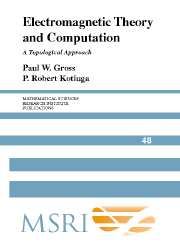Book contents
- Frontmatter
- Table of Contents
- Preface
- Introduction
- 1 From Vector Calculus to Algebraic Topology
- 2 Quasistatic Electromagnetic Fields
- 3 Duality Theorems for Manifolds With Boundary
- 4 The Finite Element Method and Data Structures
- 5 Computing Eddy Currents on Thin Conductors with Scalar Potentials
- 6 An Algorithm to Make Cuts for Magnetic Scalar Potentials
- 7 A Paradigm Problem
- Mathematical Appendix: Manifolds, Differential Forms, Cohomology, Riemannian Structures
- Bibliography
- Summary of Notation
- Examples and Tables
- Index
1 - From Vector Calculus to Algebraic Topology
Published online by Cambridge University Press: 06 July 2010
- Frontmatter
- Table of Contents
- Preface
- Introduction
- 1 From Vector Calculus to Algebraic Topology
- 2 Quasistatic Electromagnetic Fields
- 3 Duality Theorems for Manifolds With Boundary
- 4 The Finite Element Method and Data Structures
- 5 Computing Eddy Currents on Thin Conductors with Scalar Potentials
- 6 An Algorithm to Make Cuts for Magnetic Scalar Potentials
- 7 A Paradigm Problem
- Mathematical Appendix: Manifolds, Differential Forms, Cohomology, Riemannian Structures
- Bibliography
- Summary of Notation
- Examples and Tables
- Index
Summary
1A. Chains, Cochains and Integration
Homology theory reduces topological problems that arise in the use of the classical integral theorems of vector analysis to more easily resolved algebraic problems. Stokes’ theorem on manifolds, which may be considered the fundamental theorem of multivariable calculus, is the generalization of these classical integral theorems. To appreciate how these topological problems arise, the process of integration must be reinterpreted algebraically.
Given an n-dimensional region Ω, we will consider the set Cp( Ω) of all possible p-dimensional objects over which a p-fold integration can be performed. Here it is understood that 0 ≤ p ≤ n and that a 0-fold integration is the sum of values of a function evaluated on a finite set of points. The elements of Cp( Ω), called p-chains, start out conceptually as p-dimensional surfaces, but in order to serve their intended function they must be more than that, for in evaluating integrals it is essential to associate an orientation to a chain. Likewise the idea of an orientation is essential for defining the oriented boundary of a chain (Figure 1.1).
At the very least, then, we wish to ensure that our set of chains Cp(ω) is closed under orientation reversal: for each c ∈ Cp( Ω) there is also −c ∈ Cp( Ω).
Information
- Type
- Chapter
- Information
- Electromagnetic Theory and ComputationA Topological Approach, pp. 7 - 48Publisher: Cambridge University PressPrint publication year: 2004
